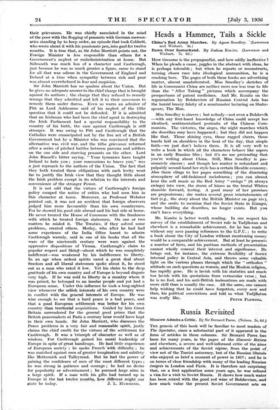Heads a Hammer, Tails a Sickle Dawn Over Samarkand. By
Joshua Kunitz. (Lawrence and Wishart. 7s. 6d.) How tiresome is the propagandist, and how oddly ineffective I When he pleads a cause, juggles in the abstract with ideas, he is perhaps tolerable ; but when he reports or reconstructs, turning chores rues into ideological ammunition, he is a crashing bore. The pages of both these books are advertising matter, almost unadulterated. Miss Smedley's sketches of life in Communist China are neither more nor less true to life than the. " After Taking " pictpres which accompany the prospectuses of patent medicines. And Mr. Kunitz on the regeneration by Bolshevism of Russian Central Asia has the horrid breezy falsity of a scoutmaster lecturing on Shake- speare, The Man.
Miss Smedley is sincere ; but nobody—not even a Bolshevik —with any first-hand knowledge of China could accept her idealised, sentimentalised - portraits of the Chinese Coni- munists.. The victories, the sieges, the night marches which she describes may have happened ; but they did not happen like that. Those shining eyes, those ragged cheers, those hands laid on shoulders in the heat of the day, that simple faith—we just don't believe them. It is all very well to write a book in which all the characters behave like supers in an early Russian film ; but it's no use pretending that you're writing about China. Still, Miss Smedley is pas- sionately sincere ; and though her matter is redundant and palpably second-hand her style has a certain likeable economy. Also there clings to her pages something of the disarming atmosphere of old-fashioned melodrama ; • you can almost hear the soft music as the Red Army " swings " (it always swings) into view, the storm of hisses as the brutal Whites shamble forward, leering. A good many of her premises are preposterous; she makes several gross misstatements of fact (e.g., the story about the British Minister on page xiv), and She omits to mention that the Soviet State in Kiangsi, whose building she describes, no longer exists. But you can't have everything.
Mr. Kunitz is better worth reading. In one respect his survey of the establishment of Soviet rule in Tadjikstan and elsewhere is a remarkable achievement, for 'lie has made it without any save passing ieferences to the G.P.U. ; to write a book about the City of London without mentioning money would be a comparable achievement. But at least he presents a number of facts, and his partisan methods of presentation cannot wholly conceal their interest and significance. He brings out, for instance, the extreme flexibility of Soviet internal policy in Central Asia, and throws some valuable light on the various phases through which the " orthodox " attitude on such questions as women, and the Moslem religion, has rapidly gone. He is lavish with his statistics and much too lavish with his quotations from vernacular verse ; but he is no fool, and his anti-British insinuations are made with more skill than is usually the case. All the same, one cannot help wishing that he could have forgotten, every now and then, his political convictions and told us what Tadjikstan was really lie. PETER FLEMING.














































 Previous page
Previous page